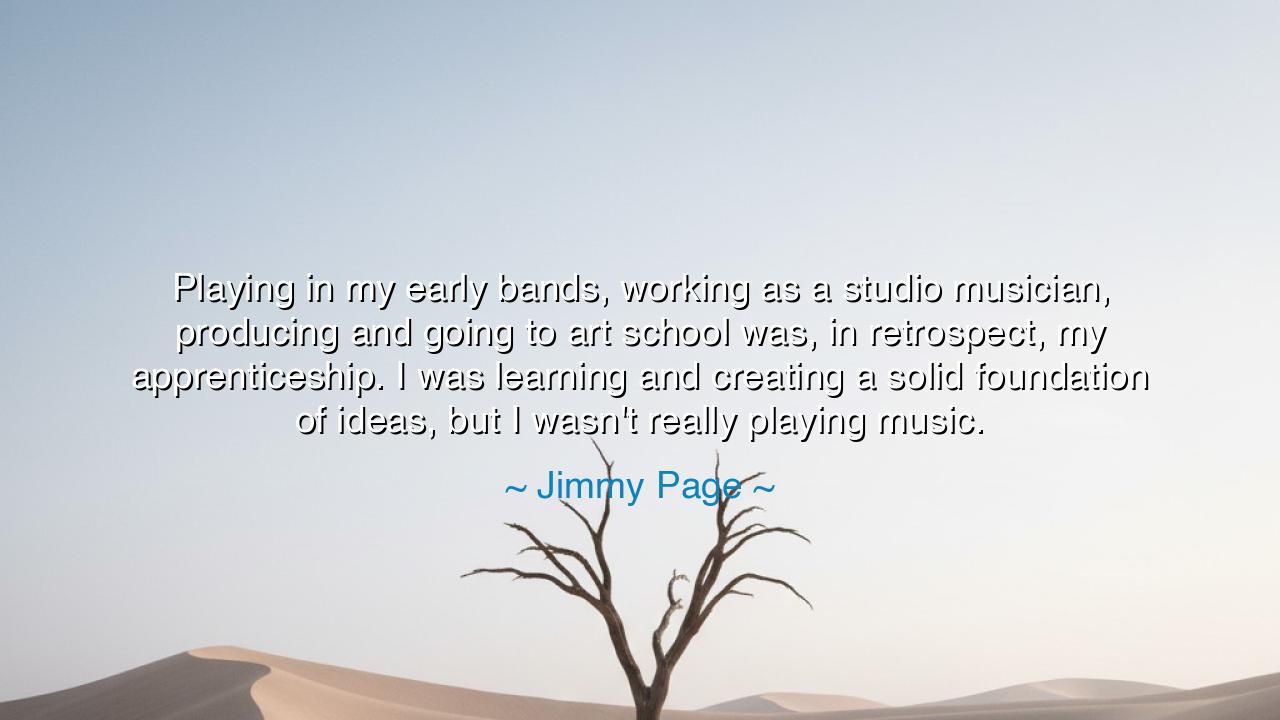
Playing in my early bands, working as a studio musician
Playing in my early bands, working as a studio musician, producing and going to art school was, in retrospect, my apprenticeship. I was learning and creating a solid foundation of ideas, but I wasn't really playing music.






Hear the craftsman speak like a mason laying the last stone of a long, unseen wall: “Playing in my early bands, working as a studio musician, producing and going to art school was, in retrospect, my apprenticeship. I was learning and creating a solid foundation of ideas, but I wasn’t really playing music.” In this confession, Jimmy Page draws a bright line between labor and liturgy, between handling the tools and calling down the fire. He names the long hallway before the sanctuary—the seasons when the hands grow skilled, the ears grow sharp, and yet the soul waits for its true altar. It is a humble chart for the pilgrim of any art: first the scaffolding, then the cathedral.
The old guilds would nod at such words. Every master first bore the broom, then the hammer, then the chisel, each in its appointed time. So Page’s early bands, his nights of hired work as a studio musician, his turn at producing, his stint in art school—these were not detours but disciplines. They taught him timing like a clockmaker, tone like a painter, arrangement like an architect. The foundation of ideas was poured in quiet, far from the roar of the crowd; it cured in patience, until it could bear the weight of vision.
Mark the distinction he carves with a careful blade: to be learning music is not yet to be playing it in the deepest sense. A person may recite prayers and not yet pray; may wield a sword and not yet be a warrior. Page says, with a craftsman’s honesty, that he lived long in the workshop before he found the doorway to the temple. This is no insult to apprenticeship; it is the highest honor, for it admits that craft prepares the vessel, but inspiration fills it. Without the vessel, inspiration spills; without inspiration, the vessel is empty.
Take a story from his own road. Before the thunder of Led Zeppelin, the young guitarist haunted London studios like a spectral metronome—laying down anonymous parts, sight-reading swiftly, slipping through styles with mercenary grace. He learned how microphones listen, how rooms sing back to you, how a producer’s eyebrow can change a take. Then, after the apprenticeship, the dam broke: in the crucible of a new band, those hidden disciplines became a single flame—riffs carrying architecture within them, arrangements that breathed, tones that painted cathedrals of sound. The secret is not that the early years were wasted, but that they were wood seasoning for the fire to come.
History offers kin for this pattern. Michelangelo ground pigments and copied masters before he ever asked marble to reveal a David; Bach tuned organs, studied counterpoint, and apprenticed in choirs before the cantatas poured forth like rivers. Their apprenticeship was not a lesser life. It was the laying of footings below the earth line, so that the visible tower would not split at heaven’s wind. Thus, Page’s words bind our age to theirs: first learn the weight of the tool, then command it; first trace the map, then walk beyond it.
The lesson is stern and sweet: do not despise the long corridor. Build your foundation of ideas where few can see—ear training, harmony, rhythm, the grammar of your craft—so that when the hour of revelation arrives, you have a house for it to live in. The yearning to “skip to the chorus” is the ruin of many; the chorus is written in the quiet, long before it is sung in the square. Apprenticeship is not exile; it is consecration.
Carry away these practices like tuning pegs in your pocket: (1) Give yourself seasons of learning with no audience—copy, transcribe, reconstruct. (2) Rotate roles—be your own producer, arranger, and editor for small projects, so your ear becomes a council, not a single voice. (3) Study outside your lane—walk through art school in spirit: color, composition, negative space; let other arts inform your phrasing. (4) Keep a book of motifs—riff, theme, or phrase—and return to it as a quarry when the commission comes. (5) Seek fellowship—your own “early bands”—where you can fail cheaply and discover bravely. Do this, and one day you will cross the same threshold Page names: the moment the tools fall silent and the music itself begins to speak—no longer work alone, but worship, born from an apprenticeship that made you ready.






AAdministratorAdministrator
Welcome, honored guests. Please leave a comment, we will respond soon